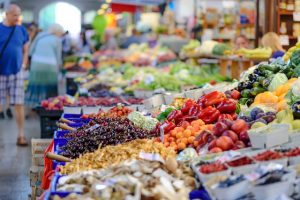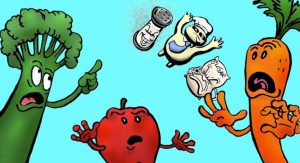Michael Pollan paints a comprehensive and convincing picture of the industrialized food system with his book “In Defense of Food”. However, despite his references to economic determinism, “Thousands of plant and animal varieties have fallen out of commerce…as industrial agriculture has focused its attention on…high yielding (and usually patented) varieties” (116); he offers no tangible or actionable solutions to the problem of our deteriorating food system besides, effectively, “voting with your dollars’. Economic factors are not the sole explanations that provide for our dietary woes but they are the ones for which he completely ignores the complexity of the potential solutions. He says nary a word about food deserts or the very real price disparity between processed food and ‘real food’, the problems that preclude people from making change through consumerism.
The fact is that those ‘real foods’ cost more than processed foods(NPR) and if you want to reap all of the health benefits that Pollan suggests, then you have to eat organic because “Organically grown crops contain…between 10 and 50 percent more (phytochemicals) than conventionally grown plants” (120). However, expect to spend between 24 and 59 percent more on those organics than “standard” ‘real foods’ (CR). Even if people can overcome the price disparity that makes eating whole foods attainable, nearly 2.3 million people in the United States don’t even have access to fresh food of any kind(Tulane). The country is rife with ‘food deserts’, where fresh food is unattainable for reasons of distance, lack of transportation, or both(USDA).
The knowledge that there are barriers to food choice makes it apparent that to actually solve our dietary problems a change in consumer behavior can only go so far. We must also engage in political action and demand resource equity; a point that Michael Pollan regrettably missed.




I loved your criticism of Michael Pollan’s book – it is a main criticism I found myself making when we were first reading it. Living in Seattle, the food deserts that are spread throughout the city, mostly in South Seattle, are a real public health issue that is completely disregarded in a discussion about health and battling the industrialized food system through consumerism, because their dollars are spent trying to pay Seattle’s insane rent and buy the cheapest food they can so their families have something to eat – and that’s nearly never at the farmer’s market, like Pollen suggests we should frequent (Pollan). Your analysis on urban food deserts, such as the aforementioned food deserts in Seattle, is insightful and important, but along with locational disparities in regards to access to healthy food, there are class and systemic barriers that also distance people from following Pollan’s recommendations. What’s even more concerning is that the food workers and farmers are an increasingly large portion of the food-insecure in our country and can’t even afford the ‘real foods’ that Pollan says we all need to eat (Alkon and Guthman). Like we learned in lecture, modern farmers sometimes can’t even feed themselves. It’s an issue fundamentally rooted in the capitalist system. So how can we fight the issue by playing along with the system we’re critiquing? Not everyone can afford farmer’s market organic vegetables, wholesale cow meat to pack in a freezer, or feed their kids homemade quinoa instead of Kraft mac ‘n cheese. You’re right – individual purchases can’t solve the institutional and political problem.